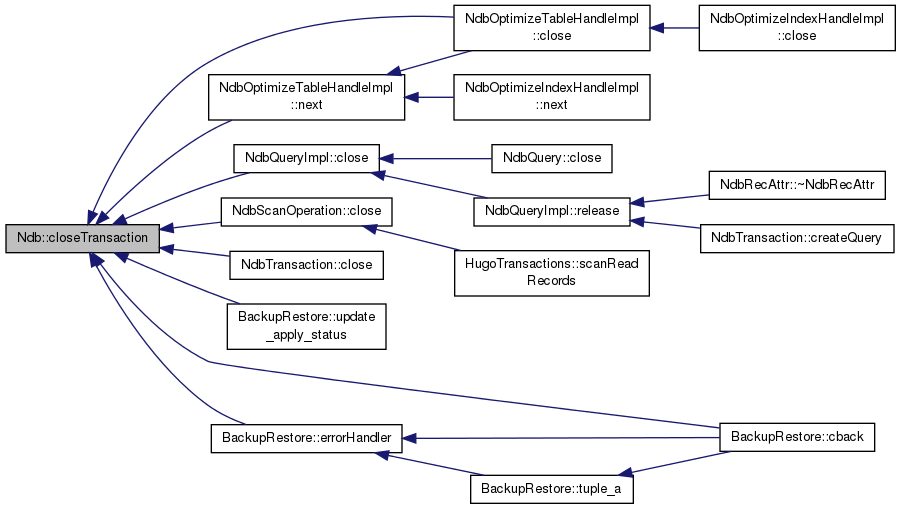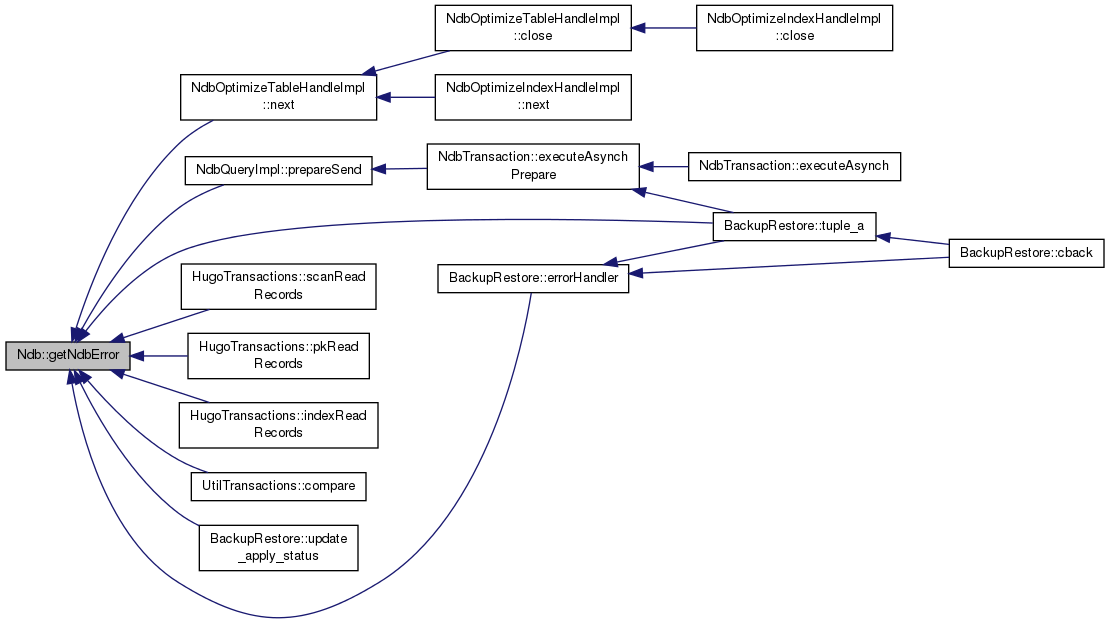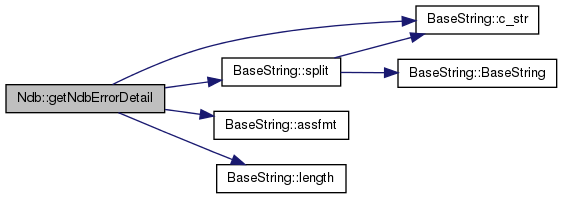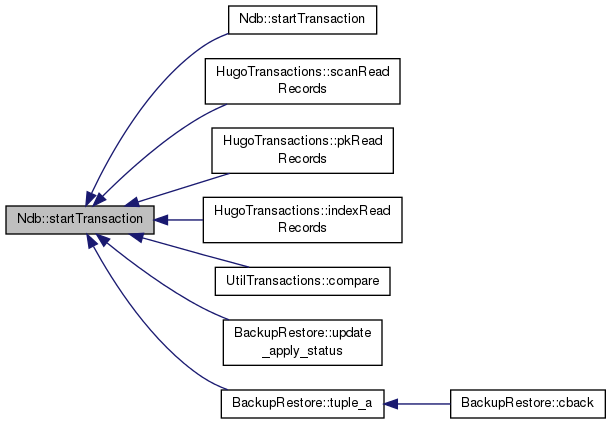|
MySQL 5.6.14 Source Code Document
|
|
MySQL 5.6.14 Source Code Document
|
Represents the NDB kernel and is the main class of the NDB API. More...
#include <Ndb.hpp>
Classes | |
| struct | Free_list_usage |
| struct | Key_part_ptr |
| struct | PartitionSpec |
| struct | PartitionSpec_v1 |
| struct | TupleIdRange |
Public Types | |
| enum | TamperType { LockGlbChp = 1, UnlockGlbChp, CrashNode, ReadRestartGCI, InsertError } |
| enum | ClientStatistics { WaitExecCompleteCount = 0, WaitScanResultCount = 1, WaitMetaRequestCount = 2, WaitNanosCount = 3, BytesSentCount = 4, BytesRecvdCount = 5, TransStartCount = 6, TransCommitCount = 7, TransAbortCount = 8, TransCloseCount = 9, PkOpCount = 10, UkOpCount = 11, TableScanCount = 12, RangeScanCount = 13, PrunedScanCount = 14, ScanBatchCount = 15, ReadRowCount = 16, TransLocalReadRowCount = 17, DataEventsRecvdCount = 18, NonDataEventsRecvdCount = 19, EventBytesRecvdCount = 20, NumClientStatistics = 21 } |
Public Member Functions | |
| int | getNodeId () |
| bool | usingFullyQualifiedNames () |
| int | initAutoIncrement () |
| int | getAutoIncrementValue (const char *aTableName, Uint64 &autoValue, Uint32 cacheSize, Uint64 step=1, Uint64 start=1) |
| int | getAutoIncrementValue (const NdbDictionary::Table *aTable, Uint64 &autoValue, Uint32 cacheSize, Uint64 step=1, Uint64 start=1) |
| int | getAutoIncrementValue (const NdbDictionary::Table *aTable, TupleIdRange &range, Uint64 &autoValue, Uint32 cacheSize, Uint64 step=1, Uint64 start=1) |
| int | readAutoIncrementValue (const char *aTableName, Uint64 &autoValue) |
| int | readAutoIncrementValue (const NdbDictionary::Table *aTable, Uint64 &autoValue) |
| int | readAutoIncrementValue (const NdbDictionary::Table *aTable, TupleIdRange &range, Uint64 &autoValue) |
| int | setAutoIncrementValue (const char *aTableName, Uint64 autoValue, bool modify) |
| int | setAutoIncrementValue (const NdbDictionary::Table *aTable, Uint64 autoValue, bool modify) |
| int | setAutoIncrementValue (const NdbDictionary::Table *aTable, TupleIdRange &range, Uint64 autoValue, bool modify) |
| bool | checkUpdateAutoIncrementValue (TupleIdRange &range, Uint64 autoValue) |
| NdbTransaction * | hupp (NdbTransaction *) |
| Uint32 | getReference () const |
| Free_list_usage * | get_free_list_usage (Free_list_usage *) |
| Uint32 | getMinDbNodeVersion () const |
| void | setCustomData (void *) |
| void * | getCustomData () const |
| Uint64 | getClientStat (Uint32 id) const |
| const char * | getClientStatName (Uint32 id) const |
General | |
| Ndb (Ndb_cluster_connection *ndb_cluster_connection, const char *aCatalogName="", const char *aSchemaName="def") | |
| ~Ndb () | |
| Ndb_cluster_connection & | get_ndb_cluster_connection () |
| const char * | getCatalogName () const |
| int | setCatalogName (const char *aCatalogName) |
| const char * | getSchemaName () const |
| int | setSchemaName (const char *aSchemaName) |
| const char * | getDatabaseName () const |
| int | setDatabaseName (const char *aDatabaseName) |
| const char * | getDatabaseSchemaName () const |
| int | setDatabaseSchemaName (const char *aDatabaseSchemaName) |
| int | setDatabaseAndSchemaName (const NdbDictionary::Table *t) |
| int | init (int maxNoOfTransactions=4) |
| int | waitUntilReady (int timeout=60) |
Meta Information | |
| class NdbDictionary::Dictionary * | getDictionary () const |
Event subscriptions | |
| NdbEventOperation * | createEventOperation (const char *eventName) |
| int | dropEventOperation (NdbEventOperation *eventOp) |
| int | pollEvents (int aMillisecondNumber, Uint64 *latestGCI=0) |
| NdbEventOperation * | nextEvent () |
| bool | isConsistent (Uint64 &gci) |
| bool | isConsistentGCI (Uint64 gci) |
| const NdbEventOperation * | getGCIEventOperations (Uint32 *iter, Uint32 *event_types) |
| int | flushIncompleteEvents (Uint64 gci) |
| NdbEventOperation * | getEventOperation (NdbEventOperation *eventOp=0) |
| Uint64 | getLatestGCI () |
| void | forceGCP () |
| void | setReportThreshEventGCISlip (unsigned thresh) |
| void | setReportThreshEventFreeMem (unsigned thresh) |
Asynchronous Transactions | |
| int | pollNdb (int aMillisecondNumber=WAITFOR_RESPONSE_TIMEOUT, int minNoOfEventsToWakeup=1) |
| void | sendPreparedTransactions (int forceSend=0) |
| int | sendPollNdb (int aMillisecondNumber=WAITFOR_RESPONSE_TIMEOUT, int minNoOfEventsToWakeup=1, int forceSend=0) |
Error Handling | |
| const NdbError & | getNdbError () const |
| const NdbError & | getNdbError (int errorCode) |
| const char * | getNdbErrorDetail (const NdbError &err, char *buff, Uint32 buffLen) const |
Friends | |
| class | NdbReceiver |
| class | NdbOperation |
| class | NdbEventOperationImpl |
| class | NdbEventBuffer |
| class | NdbTransaction |
| class | Table |
| class | NdbApiSignal |
| class | NdbIndexOperation |
| class | NdbScanOperation |
| class | NdbIndexScanOperation |
| class | NdbDictionary::Dictionary |
| class | NdbDictionaryImpl |
| class | NdbDictInterface |
| class | NdbBlob |
| class | NdbImpl |
| class | Ndb_cluster_connection |
| class | Ndb_cluster_connection_impl |
| class | Ndb_internal |
| class | NdbScanFilterImpl |
| class | PollGuard |
| class | NdbQueryImpl |
| class | NdbQueryOperationImpl |
Starting and Closing Transactions | |
| NdbTransaction * | startTransaction (const NdbDictionary::Table *table=0, const char *keyData=0, Uint32 keyLen=0) |
| NdbTransaction * | startTransaction (const NdbDictionary::Table *table, const struct Key_part_ptr *keyData, void *xfrmbuf=0, Uint32 xfrmbuflen=0) |
| NdbTransaction * | startTransaction (const NdbRecord *keyRec, const char *keyData, void *xfrmbuf, Uint32 xfrmbuflen) |
| NdbTransaction * | startTransaction (const NdbDictionary::Table *table, Uint32 partitionId) |
| void | closeTransaction (NdbTransaction *) |
| static int | computeHash (Uint32 *hashvalueptr, const NdbDictionary::Table *, const struct Key_part_ptr *keyData, void *xfrmbuf=0, Uint32 xfrmbuflen=0) |
| static int | computeHash (Uint32 *hashvalueptr, const NdbRecord *keyRec, const char *keyData, void *xfrmbuf, Uint32 xfrmbuflen) |
Represents the NDB kernel and is the main class of the NDB API.
Always start your application program by creating an Ndb object. By using several Ndb objects it is possible to design a multi-threaded application, but note that Ndb objects cannot be shared by several threads. Different threads should use different Ndb objects. A thread might however use multiple Ndb objects. Currently there is a limit of maximum 128 Ndb objects per application process.
| enum Ndb::TamperType |
Different types of tampering with the NDB Cluster. Only for debugging purposes only.
| LockGlbChp |
Lock GCP. |
| UnlockGlbChp |
Unlock GCP. |
| CrashNode |
Crash an NDB node. |
| ReadRestartGCI |
Request the restart GCI id from NDB Cluster. |
| InsertError |
Execute an error in NDB Cluster (may crash system) |
| Ndb::Ndb | ( | Ndb_cluster_connection * | ndb_cluster_connection, |
| const char * | aCatalogName = "", |
||
| const char * | aSchemaName = "def" |
||
| ) |
The Ndb object represents a connection to a database.
| ndb_cluster_connection | is a connection to the cluster containing the database to be used |
| aCatalogName | is the name of the catalog to be used. |
| aSchemaName | is the name of the schema you want to use. |
Definition at line 34 of file Ndbinit.cpp.
| void Ndb::closeTransaction | ( | NdbTransaction * | aConnection | ) |
Close a transaction.
When a SCAN timed-out, returning the NdbTransaction leads to reuse. And TC crashes when the API tries to reuse it to something else...
Something timed-out, returning the NdbTransaction leads to reuse. And TC crashes when the API tries to reuse it to something else...
NOTE: It's ok to call getNodeSequence() here wo/ having mutex,
Put it back in idle list for that node
Definition at line 954 of file Ndb.cpp.


|
static |
Compute distribution hash value given table/keys
| hashvalueptr | - OUT, is set to hashvalue if return value is 0 |
| table | Pointer to table object |
| keyData | Null-terminated array of pointers to keyParts that is part of distribution key. Length of resp. keyPart will be read from metadata and checked against passed value |
| xfrmbuf | Pointer to temporary buffer that will be used to calculate hashvalue |
| xfrmbuflen | Lengh of buffer |
Definition at line 373 of file Ndb.cpp.


| NdbEventOperation * Ndb::createEventOperation | ( | const char * | eventName | ) |
| int Ndb::dropEventOperation | ( | NdbEventOperation * | eventOp | ) |
| Ndb_cluster_connection & Ndb::get_ndb_cluster_connection | ( | ) |
| const char * Ndb::getCatalogName | ( | ) | const |
| const char * Ndb::getDatabaseName | ( | ) | const |
| const char * Ndb::getDatabaseSchemaName | ( | ) | const |
| NdbDictionary::Dictionary * Ndb::getDictionary | ( | ) | const |
| const NdbEventOperation * Ndb::getGCIEventOperations | ( | Uint32 * | iter, |
| Uint32 * | event_types | ||
| ) |
Iterate over distinct event operations which are part of current GCI. Valid after nextEvent. Used to get summary information for the epoch (e.g. list of all tables) before processing event data.
Set *iter=0 to start. Returns NULL when no more. If event_types is not NULL, it returns bitmask of received event types.
| const NdbError & Ndb::getNdbError | ( | ) | const |
Get the NdbError object
Definition at line 38 of file Ndberr.cpp.

| const NdbError & Ndb::getNdbError | ( | int | errorCode | ) |
Get a NdbError object for a specific error code
The NdbError object is valid until you call a new NDB API method.
Definition at line 30 of file Ndberr.cpp.
| const char * Ndb::getNdbErrorDetail | ( | const NdbError & | err, |
| char * | buff, | ||
| Uint32 | buffLen | ||
| ) | const |
Get a string containing any extra error details in the supplied buffer Where there is extra detail available a ptr to the start of the supplied buffer will be returned. If the extra detail string is longer than the passed buffer then it will be truncated to fit. Where there is no extra detail, NULL will be returned.
Definition at line 2107 of file Ndb.cpp.

| int Ndb::getNodeId | ( | ) |
| const char * Ndb::getSchemaName | ( | ) | const |
| int Ndb::init | ( | int | maxNoOfTransactions = 4 | ) |
Initializes the Ndb object
| maxNoOfTransactions | Maximum number of parallel NdbTransaction objects that can be handled by the Ndb object. Maximum value is 1024. |
| bool Ndb::isConsistent | ( | Uint64 & | gci | ) |
Check if all events are consistent If node failure occurs during resource exaustion events may be lost and the delivered event data might thus be incomplete.
| OUT | aGCI any inconsistent GCI found |
| bool Ndb::isConsistentGCI | ( | Uint64 | gci | ) |
Check if all events in a GCI are consistent If node failure occurs during resource exaustion events may be lost and the delivered event data might thus be incomplete.
| aGCI | the GCI to check |
| NdbEventOperation * Ndb::nextEvent | ( | ) |
| int Ndb::pollEvents | ( | int | aMillisecondNumber, |
| Uint64 * | latestGCI = 0 |
||
| ) |
| int Ndb::pollNdb | ( | int | aMillisecondNumber = WAITFOR_RESPONSE_TIMEOUT, |
| int | minNoOfEventsToWakeup = 1 |
||
| ) |
Wait for prepared transactions. Will return as soon as at least 'minNoOfEventsToWakeUp' of them have completed, or the maximum time given as timeout has passed.
| aMillisecondNumber | Maximum time to wait for transactions to complete. Polling without wait is achieved by setting the timer to zero. Time is expressed in milliseconds. |
| minNoOfEventsToWakeup | Minimum number of transactions which has to wake up before the poll-call will return. If minNoOfEventsToWakeup is set to a value larger than 1 then this is the minimum number of transactions that need to complete before the poll will return. Setting it to zero means that one should wait for all outstanding transactions to return before waking up. |
| int Ndb::sendPollNdb | ( | int | aMillisecondNumber = WAITFOR_RESPONSE_TIMEOUT, |
| int | minNoOfEventsToWakeup = 1, |
||
| int | forceSend = 0 |
||
| ) |
This is a send-poll variant that first calls Ndb::sendPreparedTransactions and then Ndb::pollNdb. It is however somewhat faster than calling the methods separately, since some mutex-operations are avoided. See documentation of Ndb::pollNdb and Ndb::sendPreparedTransactions for more details.
| aMillisecondNumber | Timeout specifier Polling without wait is achieved by setting the millisecond timer to zero. |
| minNoOfEventsToWakeup | Minimum number of transactions which has to wake up before the poll-call will return. If minNoOfEventsToWakeup is set to a value larger than 1 then this is the minimum number of transactions that need to complete before the poll-call will return. Setting it to zero means that one should wait for all outstanding transactions to return before waking up. |
| forceSend | When operations should be sent to NDB Kernel. (See Adaptive Send Algorithm.)
|
Definition at line 1315 of file Ndbif.cpp.

| void Ndb::sendPreparedTransactions | ( | int | forceSend = 0 | ) |
This send method will send all prepared database operations. The default method is to do it non-force and instead use the adaptive algorithm. (See Section Adaptive Send Algorithm.) The second option is to force the sending and finally there is the third alternative which is also non-force but also making sure that the adaptive algorithm do not notice the send. In this case the sending will be performed on a cyclical 10 millisecond event.
| forceSend | When operations should be sent to NDB Kernel. (See Adaptive Send Algorithm.)
|
Definition at line 1298 of file Ndbif.cpp.

| int Ndb::setCatalogName | ( | const char * | aCatalogName | ) |
| int Ndb::setDatabaseAndSchemaName | ( | const NdbDictionary::Table * | t | ) |
| int Ndb::setDatabaseName | ( | const char * | aDatabaseName | ) |
| int Ndb::setDatabaseSchemaName | ( | const char * | aDatabaseSchemaName | ) |
| int Ndb::setSchemaName | ( | const char * | aSchemaName | ) |
| NdbTransaction * Ndb::startTransaction | ( | const NdbDictionary::Table * | table = 0, |
| const char * | keyData = 0, |
||
| Uint32 | keyLen = 0 |
||
| ) |
Start a transaction
| table | Pointer to table object used for deciding which node to run the Transaction Coordinator on |
| keyData | Pointer to partition key corresponding to table |
| keyLen | Length of partition key expressed in bytes |
If the user supplied key data We will make a qualified quess to which node is the primary for the the fragment and contact that node
Make this unlikely...assume new interface(s) are prefered
Definition at line 771 of file Ndb.cpp.


| NdbTransaction * Ndb::startTransaction | ( | const NdbDictionary::Table * | table, |
| const struct Key_part_ptr * | keyData, | ||
| void * | xfrmbuf = 0, |
||
| Uint32 | xfrmbuflen = 0 |
||
| ) |
Start a transaction
| table | Pointer to table object used for deciding which node to run the Transaction Coordinator on |
| keyData | Null-terminated array of pointers to keyParts that is part of distribution key. Length of resp. keyPart will be read from metadata and checked against passed value |
| xfrmbuf | Pointer to temporary buffer that will be used to calculate hashvalue |
| xfrmbuflen | Lengh of buffer |
Definition at line 724 of file Ndb.cpp.

| NdbTransaction * Ndb::startTransaction | ( | const NdbDictionary::Table * | table, |
| Uint32 | partitionId | ||
| ) |
| int Ndb::waitUntilReady | ( | int | timeout = 60 | ) |
Wait for Ndb object to successfully set-up connections to the NDB kernel. Starting to use the Ndb object without using this method gives unspecified behavior.
| timeout | The maximum time we will wait for the initiation process to finish. Timeout is expressed in seconds. |
Definition at line 328 of file Ndb.cpp.

|
friend |
|
friend |